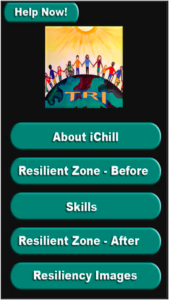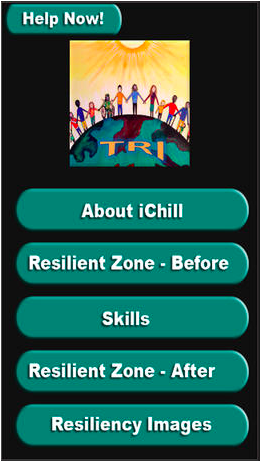In my last post, I discussed sneaky overwhelm and how to break through it using a “cheat sheet.” But sometimes, the overwhelm is more severe and may be connected to trauma and shame. We may need a much more robust cheat sheet. Thankfully, there’s an app for that!
iChill , by the Trauma Resource Institute, is one of the coolest apps I’ve ever used! Some of the great things it offers are:
, by the Trauma Resource Institute, is one of the coolest apps I’ve ever used! Some of the great things it offers are:
- education about stress and resiliency
- exercises for returning to a more resilient zone
- places to create your own, multi-media cheat sheet
- a “Help Now” button that provides a cheat sheet for those times that we don’t have one of our own
- narration in a calm, soothing voice
I thank Lela C. Carney, for the teleclass she gave to my NAPO-SFBA chapter, and for telling us about this amazing app.
Many people who struggle with organizing and productivity challenges have been repeatedly traumatized. The traumatic events may be obvious, such as a devastating injury or loss, or a series of relatively smaller losses that have a cumulative effect. But trauma can come from other sources, too, such as repeatedly feeling inadequate and unsuccessful, usually accompanied by chastising and criticism from those around us, perhaps even those we love very much and want to please.
The body’s stress response to trauma is much more complicated than I can explain here, so let’s think of it in the more simplistic terms of the “fight or flight” response that gets triggered when we’re under stress. In addition to the commonly known fight or flight responses, there are also other responses of “collapse” or “shut down.” This may be experienced as numbness, fatigue or paralysis of thought. It’s a very normal response to trauma in our lives.
When we’re experiencing one of these stress responses, it can be difficult to think and act. We’re not able to call upon our resources and be flexible, creative and strategic in our responses. We’re not very resilient. Fortunately, our bodies are designed to return to a state of resilience, but depending on our life experiences, we may not know how to do this on our own. iChill is a great tool that can help, but sometimes, even that’s not enough.
To anyone who may be experiencing the effects of trauma, please know that it’s a very normal (albeit uncomfortable) response, and there are people who can help you understand what is happening and offer resources for managing it. Many therapists specialize in working with people experiencing traumatic responses, and many other allied professionals are becoming knowledgable about trauma-informed care.

